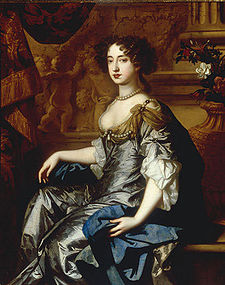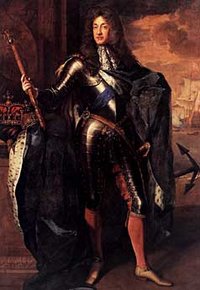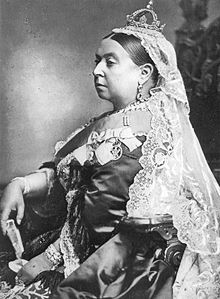
Crown and Parliament Recognition Act 1689
Encyclopedia
.jpg)

Parliament of England
The Parliament of England was the legislature of the Kingdom of England. In 1066, William of Normandy introduced a feudal system, by which he sought the advice of a council of tenants-in-chief and ecclesiastics before making laws...
, passed in 1689. It was designed to confirm the succession to the throne of King William III
William III of England
William III & II was a sovereign Prince of Orange of the House of Orange-Nassau by birth. From 1672 he governed as Stadtholder William III of Orange over Holland, Zeeland, Utrecht, Guelders, and Overijssel of the Dutch Republic. From 1689 he reigned as William III over England and Ireland...
and Queen Mary II
Mary II of England
Mary II was joint Sovereign of England, Scotland, and Ireland with her husband and first cousin, William III and II, from 1689 until her death. William and Mary, both Protestants, became king and queen regnant, respectively, following the Glorious Revolution, which resulted in the deposition of...
of England and to confirm the validity of the laws passed by the Convention Parliament which had been irregularly convened following the Glorious Revolution
Glorious Revolution
The Glorious Revolution, also called the Revolution of 1688, is the overthrow of King James II of England by a union of English Parliamentarians with the Dutch stadtholder William III of Orange-Nassau...
and the end of James II
James II of England
James II & VII was King of England and King of Ireland as James II and King of Scotland as James VII, from 6 February 1685. He was the last Catholic monarch to reign over the Kingdoms of England, Scotland, and Ireland...
's reign.
Reason for the Act

Act of Parliament
An Act of Parliament is a statute enacted as primary legislation by a national or sub-national parliament. In the Republic of Ireland the term Act of the Oireachtas is used, and in the United States the term Act of Congress is used.In Commonwealth countries, the term is used both in a narrow...
to approve it. Since no parliament was in existence at the time, it was necessary to convene one, but under the constitution only the King could summon a parliament. In the absence of a king to do so, the members of the previous parliament convened a new one themselves, without a royal summons, instead asking William to issue the summons, which he did on January 22, 1689. This irregular Parliament sat on February 13. They declared James to have abdicated, and then chose Mary (his daughter) and William (her husband and first cousin) to succeed him, and passed an Act to make it legal. This Act was the Bill of Rights 1689
Bill of Rights 1689
The Bill of Rights or the Bill of Rights 1688 is an Act of the Parliament of England.The Bill of Rights was passed by Parliament on 16 December 1689. It was a re-statement in statutory form of the Declaration of Right presented by the Convention Parliament to William and Mary in March 1689 ,...
. (In Scotland a separate Act was passed, the Claim of Right, which stated that James had forfeited the throne by his illegal actions and his failure to take the coronation oath.)
However, doubts arose as to the validity of the Bill of Rights and the other Acts passed by the Convention Parliament. Since the Parliament had not been summoned in the regular way, it was arguable that it was no parliament at all and its legislation was of no legal effect (although this occurrence was not unprecedented in English history). Therefore after the Convention Parliament was dissolved and the next parliament was summoned by the King and Queen in the normal manner, the Crown and Parliament Recognition Act was passed to confirm the validity of the royal succession and the previous parliament's legislative competence.
Controversy

Royal Assent
The granting of royal assent refers to the method by which any constitutional monarch formally approves and promulgates an act of his or her nation's parliament, thus making it a law...
to any bill in the next parliament, with the result that even the Crown and Parliament Recognition Act was of no effect either. This very point was argued before the Hereford County Court in 1944 by a litigant who represented himself in a probate
Probate
Probate is the legal process of administering the estate of a deceased person by resolving all claims and distributing the deceased person's property under the valid will. A probate court decides the validity of a testator's will...
case called Hall v. Hall. He argued that the Court of Probate Act 1857
Court of Probate Act 1857
The Court of Probate Act 1857 transferred responsibility for the granting of probate, and letters of administration, from the ecclesiastical courts of England and Wales to a new civil Court of Probate. It created a Principal Probate Registry in London and a number of district probate registries....
(which undermined his case) was of no legal effect whatsoever, since it had never received Royal Assent. It had received Royal Assent from Queen Victoria
Victoria of the United Kingdom
Victoria was the monarch of the United Kingdom of Great Britain and Ireland from 20 June 1837 until her death. From 1 May 1876, she used the additional title of Empress of India....
, but according to his argument Victoria had never legally inherited the throne, because the Bill of Rights and the Act of Settlement 1701
Act of Settlement 1701
The Act of Settlement is an act of the Parliament of England that was passed in 1701 to settle the succession to the English throne on the Electress Sophia of Hanover and her Protestant heirs. The act was later extended to Scotland, as a result of the Treaty of Union , enacted in the Acts of Union...
(which also altered the line of succession to the throne
Line of succession to the British Throne
The line of succession to the British throne is the ordered sequence of those people eligible to succeed to the throne of the United Kingdom and the other 15 Commonwealth realms. By the terms of the Act of Settlement 1701, the succession is limited to the descendants of the Electress Sophia of...
) were of no effect, since both had been assented to by William III, who was not the real king. Therefore Victoria had never been the real queen and so the Probate Act (like every other Act passed since 1689) was not the law. Understandably, the judge ruled against him, and the point has never been argued in court since.
Although the judge did not give detailed reasons for his decision, a counterpoint to the above argument has been advanced by academics: "One possible answer, deducible from rationalizations of later medieval practice when usurpations of the throne were not uncommon, is that ... [a]s a matter of State necessity ... a de facto
De facto
De facto is a Latin expression that means "concerning fact." In law, it often means "in practice but not necessarily ordained by law" or "in practice or actuality, but not officially established." It is commonly used in contrast to de jure when referring to matters of law, governance, or...
King had been regarded as competent to summon a lawful Parliament."
Text of the Act
"An Act for Recognizing King William and Queene Mary and for avoiding all Questions touching the Acts made in the Parliament assembled at Westminster the thirteenth day of February one thousand six hundred eighty eight. [Note: this date is given in the Old StyleOld Style and New Style dates
Old Style and New Style are used in English language historical studies either to indicate that the start of the Julian year has been adjusted to start on 1 January even though documents written at the time use a different start of year ; or to indicate that a date conforms to the Julian...
calendar.]
Wee your Majestyes most humble and loyall subjects the lords spirituall and temporall and commons in this present Parlyament assembled doe beseech your most excellent Majestyes that it may be published and declared in this High Court of Parlyament and enacted by authoritie of the same that we doe recognize and acknowledge your Majestyes were are and of right ought to be [by] the laws of this realme our soveraigne liege lord and lady King and Queene of England France and Ireland and the dominions thereunto belonging in and to whose princely persons the royall state crowne and dignity of the said realms with all honours stiles regalities prerogatives powers jurisdictions and authorities to the same belonging and appertaining are most fully rightfully and intirely invested and incorporated united and annexed. And for the avoiding of all disputes and questions concerning the being and authority of the late Parliament assembled at Westminster the thirteenth day of February one thousand six hundred eighty eight wee doe most humbly beseech your Majestyes that it may be enacted and bee it enacted by the King and Queenes most excellent Majestyes by and with the advice and consent of the lords spirituall and temporall and commons in this present Parlyament assembled and by authoritie of the same that all and singular the Acts made and enacted in the said Parlyament were and are laws and statutes of this kingdome and as such ought to be reputed taken and obeyed by all the people of this kingdome."
Ireland
In the Kingdom of IrelandKingdom of Ireland
The Kingdom of Ireland refers to the country of Ireland in the period between the proclamation of Henry VIII as King of Ireland by the Crown of Ireland Act 1542 and the Act of Union in 1800. It replaced the Lordship of Ireland, which had been created in 1171...
another act, entitled An Act of Recognition, of their Majesties [sic] undoubted Right to the Crown of Ireland was passed in 1692 by the Irish parliament, which made similar provision.

